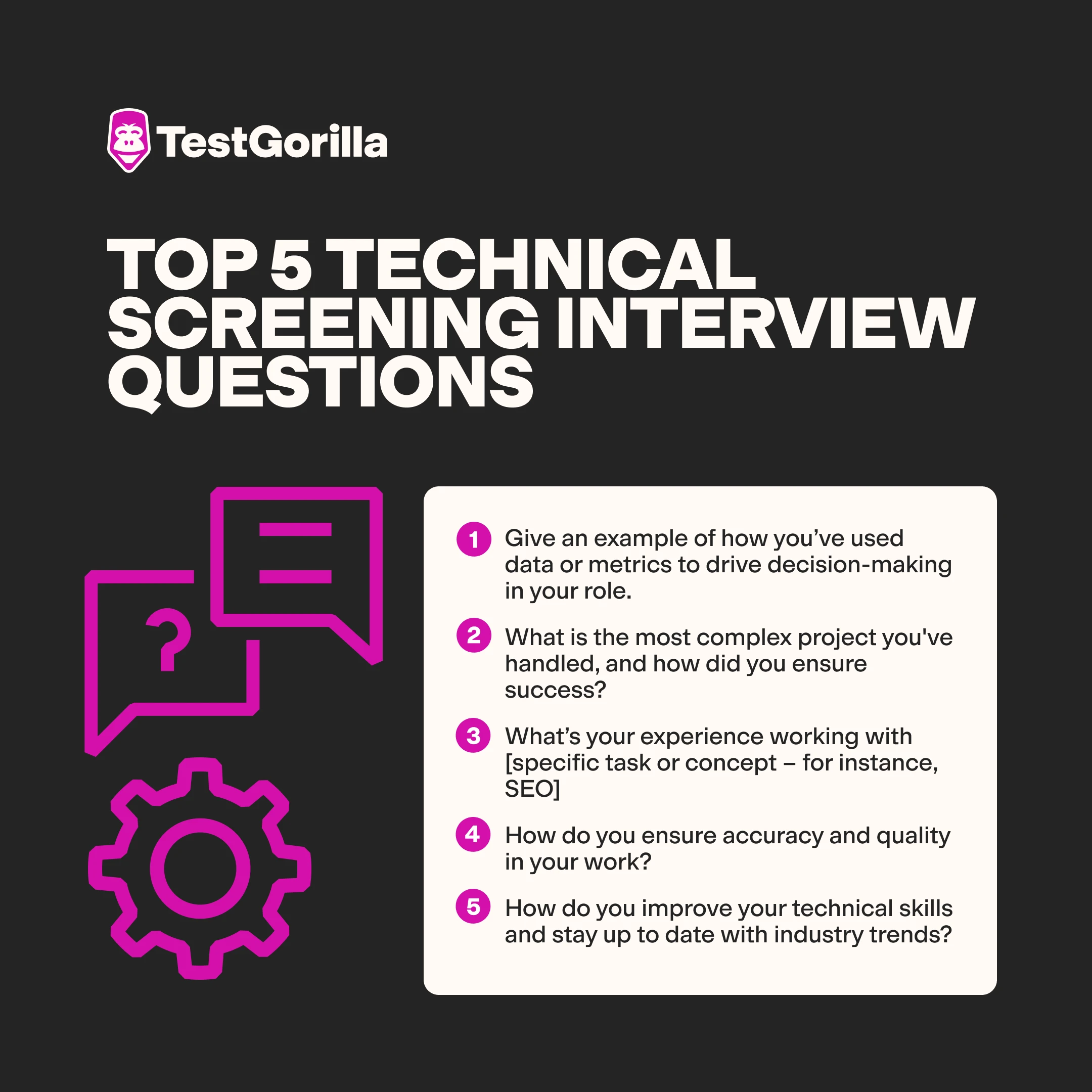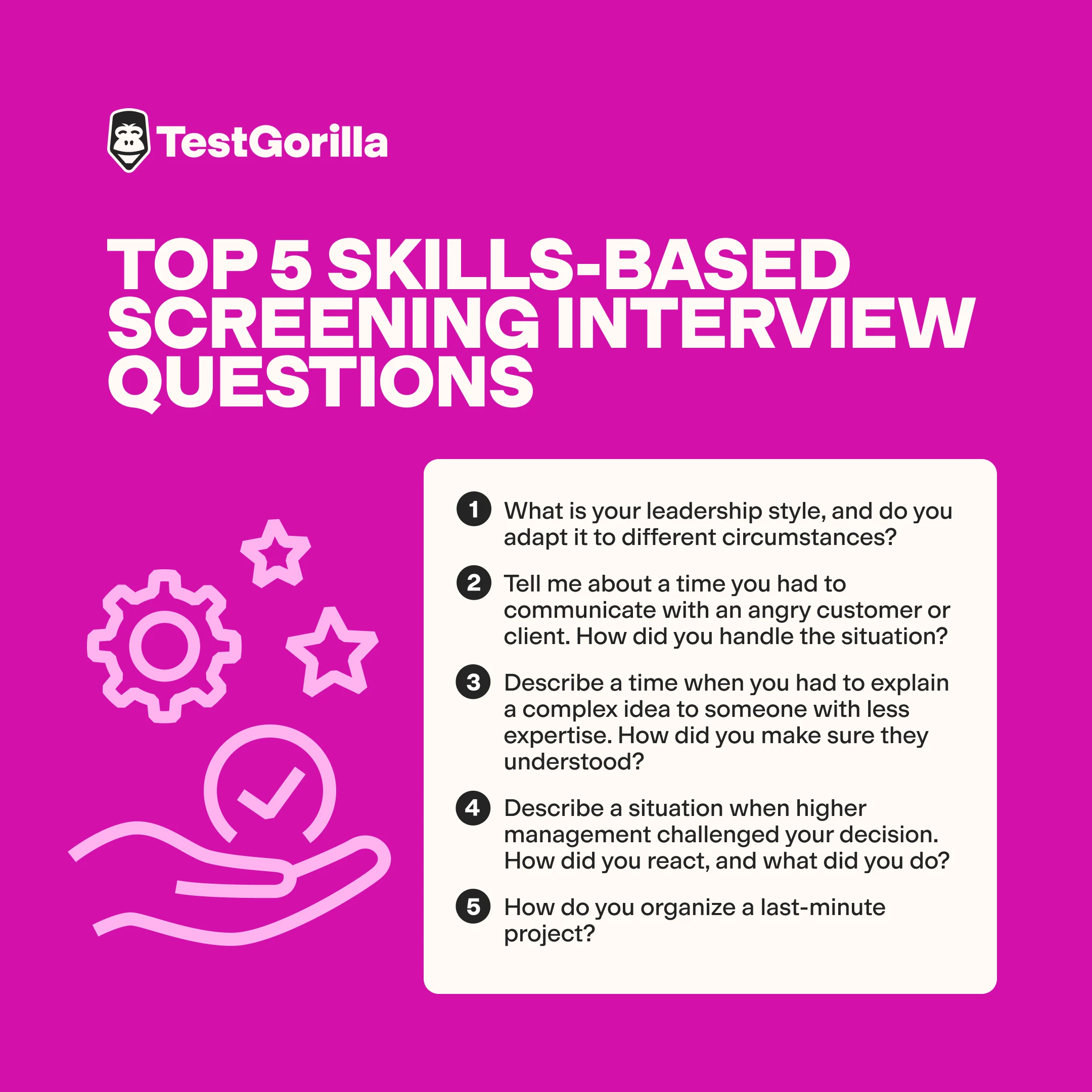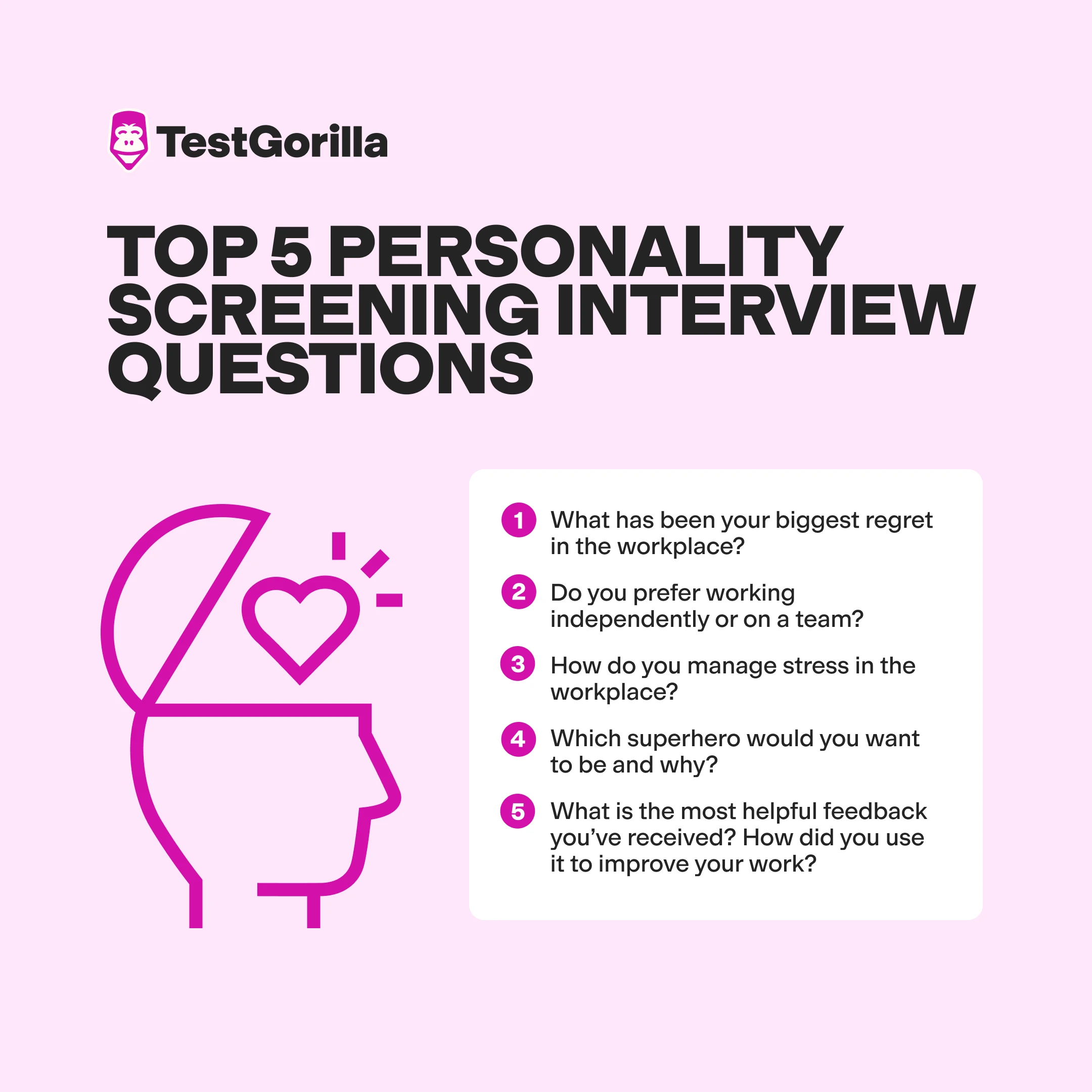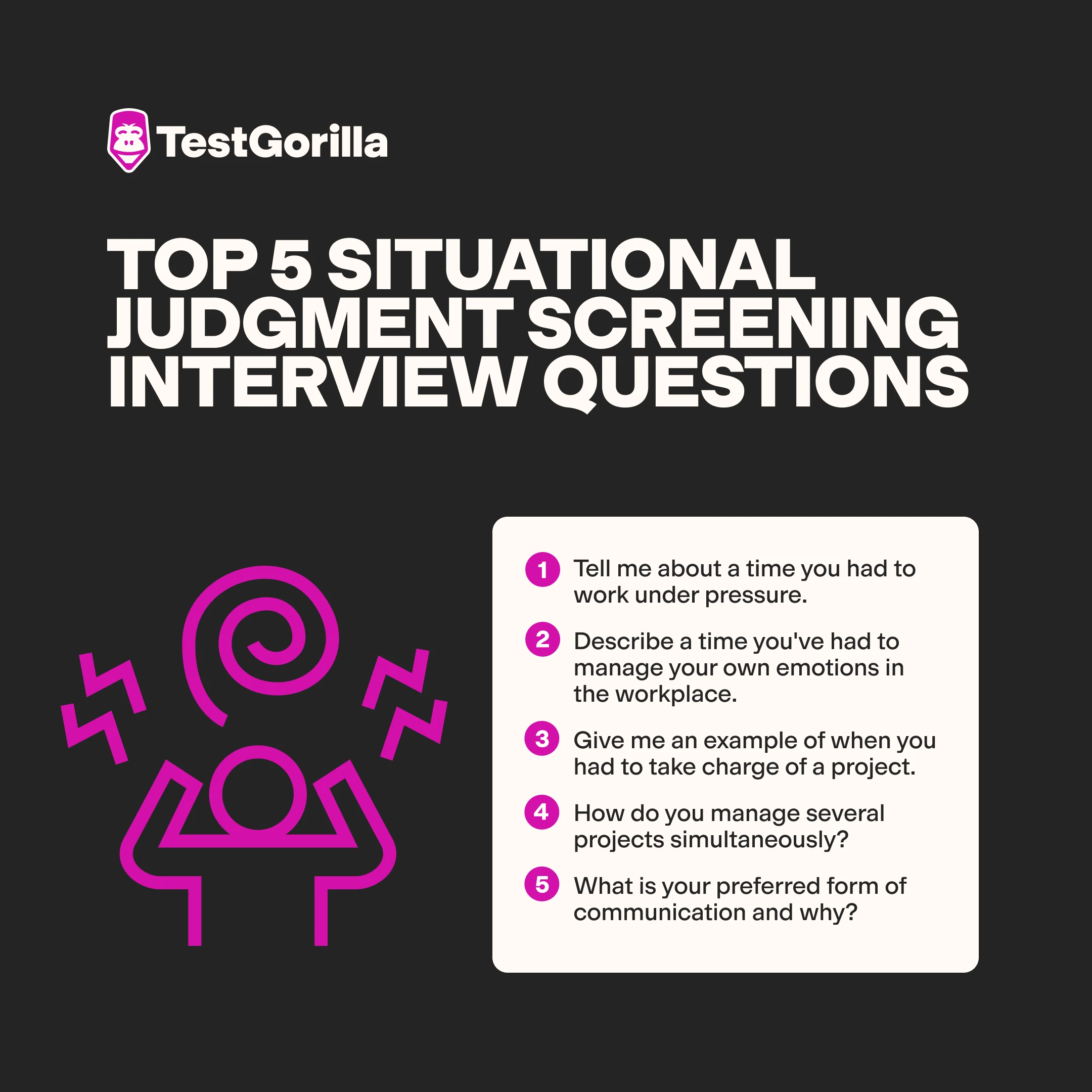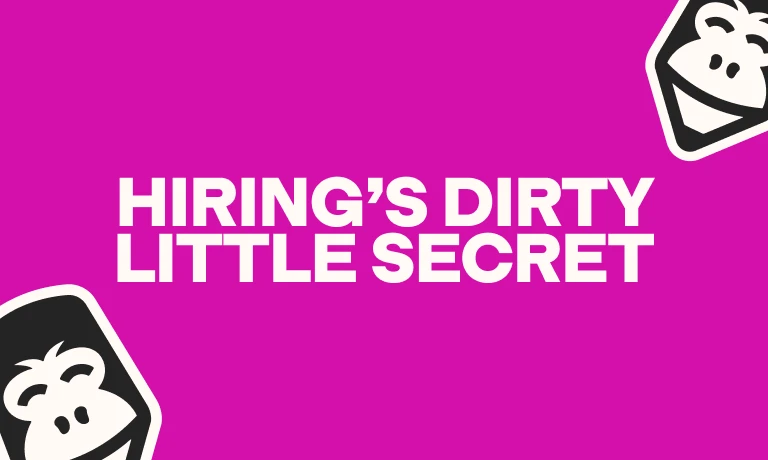50 screening interview questions to help you find top talent
Hiring managers and recruiters know the struggle of screening dozens – or even hundreds – of applicants for first-round interviews.
Interviewer bias, one-dimensional questions, and a lack of consistency can also lead to decisions that miss the mark.
Don’t sweat it, though. To help you avoid these challenges, we’ve compiled 50 powerful screening interview questions (+ ideal answers for top questions). And that’s not all – we let you in on an alternative screening method that can help you hire faster, smarter, and cheaper.
Table of contents
- Key takeaways
- 12 technical screening interview questions
- Ideal answers for the top 5 technical screening interview questions
- 13 soft skills screening interview questions
- Ideal answers for the top 5 skills-based screening interview questions and answers
- 10 personality screening interview questions
- Ideal answers for the top 5 personality screening interview questions
- 15 situational judgment screening interview questions
- Ideal answers for the top 5 situational judgment screening interview questions
- At which stage of the hiring process should you use screening interview questions?
- Screen top talent with the right interview questions and talent assessments
Key takeaways
The right screening interview questions can help you shortlist top applicants for your open positions.
Use a strong mix of questions, including those that test candidates' hard skills, soft skills, behavioral traits, and situational judgment.
Prioritize questions most closely aligned with the needs of the job and look for specific, realistic answers.
Ultimately, screening interviews are time-consuming and prone to biases. Consider multi-measure talent assessments for quick and fair screening decisions, and use interviews to dig deeper into candidates' capabilities.
12 technical screening interview questions
Let's face it – you need someone who can produce strong business results. Even the nicest or most hard-working employees can't succeed if they lack the technical expertise needed for the job.
Below are some sample technical screening interview questions you can use as is or draw inspiration from when assessing your candidates' job-specific skills and knowledge.
Describe a project where you used [specific skill or software]. What was the outcome?
Give an example of how you’ve used data or metrics to drive decision-making in your role.
What is the most complex project you've handled, and how did you ensure success?
Describe a time when you've improved processes in your daily role.
How do you think technology will impact this role?
Can you name some of the latest trends that could benefit our company?
What [technical expertise – for example, programming language] are you well versed in?
What’s your experience working with [specific task or concept – for instance, SEO]?
How would you describe a project plan?
How do you ensure accuracy and quality in your work?
What are your thoughts on working in an agile environment?
How do you improve your technical skills and stay up to date with industry trends?
The best insights on HR and recruitment, delivered to your inbox.
Biweekly updates. No spam. Unsubscribe any time.
Ideal answers for the top 5 technical screening interview questions
Refer to these technical questions and sample answers after the screening interview to better understand the candidate’s knowledge and skills.
1. Give an example of how you’ve used data or metrics to drive decision-making in your role.
In a world where data is king, you must ensure candidates are good at reading, analyzing, and using data to make informed choices. Look for answers that specifically describe the type of data or metrics a candidate used and how they used this information to achieve positive outcomes for the business.
2. What is the most complex project you've handled, and how did you ensure success?
An applicant's most complex project speaks volumes about the extent of their technical knowledge, ability to handle pressure, and problem-solving capabilities. Look for specific challenges and the steps candidates took to overcome them. Great answers will include examples of planning, resource management, and positive collaboration with others.
3. What’s your experience working with [specific task or concept – for instance, SEO]
The ideal candidate will provide specific examples of successful SEO or other techniques, demonstrating deep rather than surface-level knowledge. For example, a good candidate might explain which strategies they'd use to help your company become more visible to the right audience via online channels.
4. How do you ensure accuracy and quality in your work??
Answers to this question will show whether candidates take the time to double-check and ensure they're working to the highest standard. The best candidates will explain meticulously what steps they use to reduce errors in their work and how they rectify mistakes that crop up at the last minute.
5. How do you improve your technical skills and stay up to date with industry trends?
A study by McKinsey & Company found that 87% of companies believe they currently have a skills gap or will expect one in a few years. Thus, it's essential to find candidates who are not only open to upskilling or reskilling but also take proactive steps to improve their abilities and stay updated with the latest tools and tech.
An exceptional candidate should give examples of specific steps they take to improve their technical skills – for instance, through online courses and certifications or training workshops.
13 soft skills screening interview questions
According to the World Economic Forum (WEF), 44% of employees' skills will be disrupted in the next few years. As a result, employers are prioritizing soft transferrable skills now more than ever. Use these soft skills screening interview questions to spot top candidates.
How do you organize a last-minute project?
What is your leadership style, and do you adapt it to different circumstances?
Tell me about a time you had to communicate with an angry customer or client. How did you handle the situation?
Describe a time when you had to explain a complex idea to someone with less expertise. How did you make sure they understood?
What steps do you take when preparing for a big presentation?
What does good customer service mean to you?
How do you approach delegating tasks to your team members?
How do you handle sudden disruptions to your routine?
Give me an example of when you had to work on a project independently.
Talk me through the steps of planning your schedule at work.
Describe a situation when higher management challenged your decision. How did you react and what did you do?
How would you deal with a disagreement among your team members?
Tell me about a time when you took the initiative to solve a problem that wasn’t directly your responsibility.
Ideal answers for the top 5 skills-based screening interview questions and answers
Check out the best responses to these soft skills questions to compare how candidates respond differently.
1. What is your leadership style, and do you adapt it to different circumstances?
Hiring potential leaders can be challenging for many recruiters. According to a Gallup study, 82% of companies fail to hire the right candidate for management/leadership positions.
This hiring mistake can lead to increased turnover rates and poor productivity among team members. So, it's critical to learn about each candidate’s leadership style and if/how they can flex their style to suit varying audiences.
Make sure the candidate clearly defines their unique leadership style and how they would use it to guide team members and enforce a positive work culture.
2. Tell me about a time you had to communicate with an angry customer or client. How did you handle the situation?
Not every customer will be entirely satisfied with your services or products. However, candidates should know how to de-escalate these situations to prevent further negative responses.
Ideal answers will show how candidates used their communication and problem-solving skills to resolve disagreements, ensuring both customers and team members are satisfied. Promising candidates will provide concrete examples of how they’ve handled confrontations in the past and talk you through each step of their process.
3. Describe a time when you had to explain a complex idea to someone with less expertise. How did you make sure they understood?
This question is so important because it reveals a candidate’s communication skills, patience, and ability to adapt their message to different audiences. These qualities are especially valuable when working with diverse teams or clients.
Strong candidates will clearly show how they simplified a complex idea, used relatable examples, or broke it into digestible concepts. The best will be skilled at distilling information without losing its core meaning.
4. Describe a situation when higher management challenged your decision. How did you react, and what did you do?
Disagreements are normal, but candidates should have a clear and logical way of deciding whether to defend their stance or take feedback on board and adapt if their senior leaders were right.
In instances where they're sticking with their beliefs, look for specific insights into how they communicated their decision to senior management using a data-driven approach and non-offensive communication.
5. How do you organize a last-minute project?
Candidates with strong organizational skills are more likely to meet deadlines and complete tasks on time. They know how to plan projects and organize last-minute tasks to satisfy client needs.
The best candidates will discuss previous instances of last-minute projects, showcasing how they got things done in time through quick thinking, prioritization, effective time management, delegation, and other techniques.
If candidates can't recall previous examples, reframe your question as a hypothetical one – for instance, how would you organize a last-minute project relating to [nature of project] in [time]. This also allows you to customize the question to your company's needs.
10 personality screening interview questions
A common interview mistake is to focus only on skills and work experience rather than the candidate’s behaviors and mindset. Therefore, during the interview, try to find out whether they have the right attitude, values, and motivation to make a positive impact on your company.
Ask applicants these personality screening interview questions to discover more about their unique beliefs and character traits.
Can you tell me about one of your professional achievements?
What has been your biggest regret in the workplace?
Do you prefer working independently or on a team?
What cause are you most passionate about?
Can you describe a time when you noticed a colleague struggling? How did you respond?
How do you manage stress in the workplace?
Which superhero would you want to be and why?
Describe a time you had to adapt to sudden change.
What is one thing you would change about your personality?
What is the most helpful feedback you’ve received? How did you use it to improve your work?
Ideal answers for the top 5 personality screening interview questions
Here are the best personality screening questions and sample answers that can help you evaluate your candidates’ responses.
1. What has been your biggest regret in the workplace?
This is an excellent question because it provides insights into a candidate’s self-awareness, honesty, and ability to grow from past experiences. Strong candidates will openly accept their mistakes or regrets without pointing fingers.
Look for specific and realistic regrets, such as performance issues, missed opportunities, or interactions gone wrong, and pay close attention to how candidates recognize and learn from these situations.
2. Do you prefer working independently or on a team?
The ideal candidate will openly indicate what they prefer while also showing the ability to work as part of team projects or independently. It’s normal to have preferences, but if a candidate doesn’t want to collaborate with others, their lack of communication may lead to poor team cohesion.
3. How do you manage stress in the workplace?
Research suggests that 57% of employees experience daily stress at work, which may derive from factors like tight deadlines or challenging clients. Candidates should have a plan to reduce emotional strain to protect their mental health and maintain productivity.
A good candidate will share concrete examples of the steps they take to manage and reduce their stress. For example, they might journal, track daily stressors, or engage in mindfulness activities.
4. Which superhero would you want to be and why?
This question may seem random, but it’s a fun topic to add to the screening interview. An ideal candidate will take the time to think of a unique but honest response to distinguish themselves from other applicants.
Even if you don’t know who the superhero is, jot down their answer and consider which strengths, powers, and weaknesses they describe.
That said, if applicants aren't familiar with superheroes, don't penalize them for their lack of knowledge in this domain. Simply switch the question to a more generic one – for instance, "If you could choose a superpower, what would it be and why?"
5. What is the most helpful feedback you’ve received? How did you use it to improve your work?
To better understand a candidate’s personality, you should ask them about their weaknesses and how they receive feedback.
The best answers will resemble the STAR method, which explains the situation, task, action, and result. Candidates should be honest about constructive criticism they’ve received in previous jobs, whether it’s to do with their communication skills, ability to plan projects, or something else, and explain clearly how they used these insights to learn and improve.
15 situational judgment screening interview questions
Finally, situational judgment interview questions give you deeper insights into candidates' thought processes, judgment, and how they make decisions. Ask applicants some of these 15 situational judgment or behavioral questions in their screening interviews.
Tell me about a time you had to work under pressure. How did you approach the situation, and what was the outcome?
How do you approach a new challenge?
Describe a situation where you had to get buy-in on something from a resistant individual or group. How did you go about convincing them?
Tell me about a time you've had to mentor someone. How did you support their professional development?
Describe a time you've had to manage your own emotions in the workplace.
Give me an example of when you had to lead a project.
Have you ever had to set goals for the entire team?
Talk me through your process of creating personal goals.
How do you manage several projects at once?
Tell me about a time you had to resolve a conflict at work. How did you do it?
How do you handle unexpected changes to projects?
What is your preferred form of communication and why?
Describe a time you had to make a good first impression on a client.
What makes an ideal colleague in your eyes?
Describe a time when you had to make a difficult ethical decision at work. What did you do?
Ideal answers for the top 5 situational judgment screening interview questions
Here are the best answers for the top situational judgment screening questions.
1. Tell me about a time you had to work under pressure.
Candidates should be able to work under pressure, especially in today's highly competitive and constantly evolving market.
The ideal candidate will give a crystal clear example of a time they had to work under pressure – for example, dealing with tight deadlines, difficult clients, competitive markets, and so on. Look for responses that not only describe the situation but also neatly outline what action the candidate took and how they contributed to a positive outcome for the team.
2. Describe a time you've had to manage your own emotions in the workplace.
It's not uncommon to experience moments that bring out your emotions – even at work. This could be anything from a failed project or lost deal to having to lay off an employee. While emotions are normal, what’s essential is how you deal with them.
Good candidates will be open and honest about the situations that have made them upset or uncomfortable. The best candidates will tell you how exactly they managed and stabilized themselves in the situation – for instance, through mindfulness, stepping away for a moment, or other techniques – and how it prepared them for future scenarios.
3. Give me an example of when you had to take charge of a project.
This question gives you a glimpse into candidates' leadership styles – even if they're not leaders yet. Good candidates will discuss their approach to managing or leading projects – for instance, using agile methods or naming specific project management software.
But the best candidates will also touch on how they managed other team members on the project – for example, delegating tasks based on strengths, providing ownership, supporting them when needed, and more.
4. How do you manage several projects simultaneously?
As you scale, you need people who can multi-task, manage their time well, and complete several projects without compromising on quality or deadlines. An effective
candidate will explain the tools and techniques they use when organizing projects to prevent missed deadlines or unhappy clients. They might talk about task management software or other strategies that help get the work done.
You might also consider some follow-up questions to dive further into the types of projects they worked on simultaneously. For instance, someone working on projects with totally different scopes of work might be especially useful if your business runs varied projects at any given time.
5. What is your preferred form of communication and why?
This question can help you understand a candidate’s communication style and preferred means of communicating – for instance, in-person, email, etc.
Look for candidates who not only tell you their preferences but also explain the logic behind their preference and how it benefits them at work. For example, a candidate might lean toward in-person interaction because they prefer instant responses or are better at reading people's body language.
Also look out for signs that candidates are active listeners, which is an exceptional quality in professional settings.
At which stage of the hiring process should you use screening interview questions?
While well-rounded screening questions are a powerful tool, interviews are time-consuming and prone to interviewer biases.
That's why we recommend your first candidates through relevant talent assessments – for instance, with TestGorilla – and then use these screening interview questions to dig deeper into their capabilities and attributes.
These talent assessments measure candidates on everything from technical skills and cognitive abilities to soft skills, personality traits, and situational judgment, giving you a complete picture of your candidates' profiles.
This not only saves time but also ensures you only interview candidates with relevant skills, knowledge, and character traits.
Screen top talent with the right interview questions and talent assessments
A well-thought-out set of screening interview questions can help you sift through applicants and identify those who are truly fit to proceed to the next round.
Ensure your question bank isn't limited to technical topics by including soft skills, personality, and situational judgment questions. These give you a holisitic view of your applicants' abilities and aid better decision-making.
That said, screening interviews are still time-consuming and bias-laden, and certainly not ideal for a high volume of applications. The best way to screen candidates is through TestGorilla's library of 350+ science-backed tests comprising cognitive ability, language, personality and culture, programming, situational judgment, software, and role-specific tests.
Most assessments are only 10–30 minutes long and can help you identify the best talent for your open position.
Create a free account or sign up for a demo with TestGorilla today.
You've scrolled this far
Why not try TestGorilla for free, and see what happens when you put skills first.


